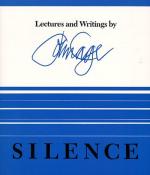
|
| Name: _________________________ | Period: ___________________ |
This test consists of 5 multiple choice questions, 5 short answer questions, and 10 short essay questions.
Multiple Choice Questions
1. All three parts of "Composition as Process" were given in what country?
(a) Austria.
(b) Germany.
(c) England.
(d) France.
2. In what month were all three parts of "Composition as Process" given?
(a) July,
(b) May.
(c) September.
(d) January.
3. What composer wrote "The Art of the Fugue"?
(a) Nikolai Medtner.
(b) Karlheinz Stockhausen.
(c) Johann Sebastian Bach.
(d) Ottorino Respighi.
4. Where did Cage recall taking eight children to a zoo?
(a) Bear Mountain Park.
(b) Bear Lake Park.
(c) Bear Mountain Lake.
(d) Bear Lake Mountain.
5. Cage had a method for bringing about unpredictability where he tossed how many coins?
(a) Two coins.
(b) Four coins.
(c) Three coins.
(d) Six coins.
Short Answer Questions
1. What grade was Cage in when his dad mentioned a trip to another country, which never happened?
2. What group asked Cage whether the American avant-garde followed the same direction as the European one?
3. In what year did Cage's essay on Erik Satie first appear?
4. "Imaginary Landscape No. 4" was written for how many radios?
5. Who had 12 tones and governed the La Domaine Musicale, according to Cage's essay on Erik Satie?
Short Essay Questions
1. Describe what Cage said about the French and the Italians in a conversation he recalls having at a Venetian restaurant.
2. Why does Cage format "Erik Satie" in a way where he and Satie never hear what the other is saying?
3. Why does Cage say that compositions indeterminate with respect to their performance are by definition experimental?
4. What happened to Cage when he and Xenia went to New York, expecting to stay with a friend named Max?
5. What does Cage say about finding facts on the life and work of Edgard Varese?
6. How does Cage describe the creation of "Music for Piano"?
7. How does Cage describe the way Christian Wolff wrote music?
8. How has Cage's process of composition evolved?
9. Why is each column in "Composition as Process--1: Changes" interrupted by space without words?
10. What does Cage believe the future holds for sounds that are heard on a regular basis?
|
This section contains 734 words (approx. 3 pages at 300 words per page) |

|




